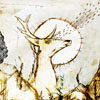 This worthy album by sextet Sparrows Swarm and Sing links traditional song with post-rock and pantheist imagery. SSAS create beautiful music with apocalyptic undercurrents which at times achieves a cinematic splendor.
This worthy album by sextet Sparrows Swarm and Sing links traditional song with post-rock and pantheist imagery. SSAS create beautiful music with apocalyptic undercurrents which at times achieves a cinematic splendor.
The complex instrumentation includes glockenspiel, cello, guitar, pianorgan, violin, drums and bass guitar. The band is composed of trained composers, visual artists and recording engineers, so the songs are complex, sophisticated and often extended in length. "Across Canyons/Canyons" begins with the sounds of twittering birds and a faint lonely guitar, then swells into an extended piece of sublimely simple melancholy. Reaching a crescendo around the 11-minute mark, it then lulls and peaks pleasantly for another quarter of an hour or so. Obviously, brevity and economy aren't the main goals for SSAS.
Normally I much prefer this kind of music to be purely instrumental pieces, or have only a light sprinkling of spoken word. Unfortunately, "Father Death/Mother Nature (Part 1)" includes vocals in addition to some very irksome yelling. I'd like to notify the members of SSAS: “You aren’t a mini-skirted chanteuse or a goosebump-inspiring choir of Bulgarian women in national costume, nor are you Marc Bolan, so please stop spoiling your music with your wordless vocals.” However, looking at Jason Fiske’s artwork—an anonymous pioneer, a praying figure bereft of flesh, the lifeforce streaming out of a deer's eyes, and the moon—the realization dawned on me that SSAS are simply communicating uncorrupted exuberance. I should let them be. In live performance, these vocals would probably work better in any case. Either way, the guitar backdrops during the second movement of the piece—strongly evocative of the epic yet understated qualities of Brokeback—and the final movement which digresses into a nice free-folk-jazz freak-out, are both worth the trip.
"Warm Blood Within (Part 2)" begins with a dynamic riff that is more Michael Nyman than Mogwai, then slips into unsatisfying vocals for a while. Thankfully, SSAS have the good sense to cut this short with a splendid cacophony, followed by a long section of stately cello, violin and piano. Once again, all is forgiven.
The final piece, "O Shenandoah," borrows a refrain from a traditional American folk song that has been collected by Alan Lomax and Carl Sandburg, among others, and is known variously as a West Indies rowing shanty, a river song, or a US army song. The song has various spellings and versions, but it is known to cavalry and wagon soldiers of the Old West, as well as Canadian and American mountain men, traders, voyagers and trappers. It's old as the hills. My favorite version refers to the courtship of a white trader and a daughter of the Indian chief, Skenandoah, an Iroquois. They happily ran away together but were caught, with consequences more severe than those suffered by Abelard and Heloise.
Somehow, SSAS do justice to a classic song like "O Shenandoah" without sounding like an embarrassing 21st century campfire sing-along. Lyrically, they shift back and forth from the river as metaphor, to the chief's daughter, before what sounds like bombs falling in the night and an eerie super-amplified wine glass announce the return of the apocalyptic post-rock beauty for which this collective are known. More tempered vocals appear before we are treated to a great quivering otherworldly ending which could almost come from the work of the late György Ligeti.
samples:
Read More

